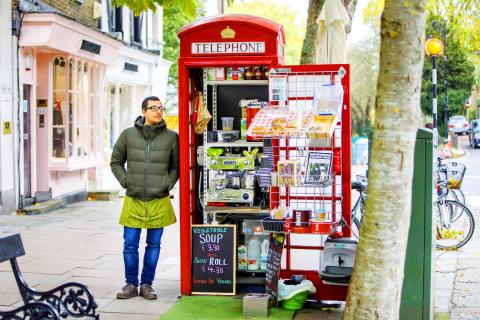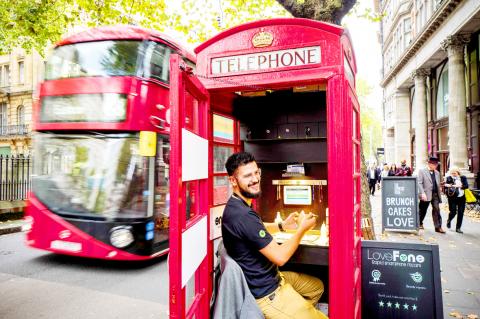Facing extinction due to ubiquitous mobile phones, Britain’s classic red telephone boxes are being saved from death row by ingenious conversions into all sorts of new uses.
“It smells nice,” a passer-by said while sniffing the waft of hot stew steaming out of one phone box in the heart of London.
Every day, dozens of office workers come down to Bloomsbury Square to get their lunch at a phone box that has been converted to hold a tiny refrigerator and shelves to put the dishes on.

Photo: AFP
The generous salads — the house speciality — go down particularly well with customers who like to sit in the square’s gardens to enjoy their lunch.
It is one of thousands of phone boxes which are enjoying a new lease of life.
Often abandoned, vandalized or reeking of urine, some have been transformed into libraries, art galleries and information hubs; others into cafes, hat shops or even heart defibrillator points.

Photo: AFP
Since their numbers peaked at 92,000 across Britain in 2002, phone boxes have been in rapid decline.
There are 42,000 left, of which 7,000 are the classic red booths loved by tourists.
British telecoms giant BT Group PLC plans to remove 20,000 more by 2022.
It said most of its phone booths lose money, while maintaining them costs £5 million (US$6.7 million) a year.
Overall, 33,000 calls are made daily from phone boxes, a drop of 90 percent in 10 years.
The best-known model is the K6, in pillar-box red with a crown embossed on its curved roof. It was the first to be installed as a standard around the country.
It was designed by the British architect Giles Gilbert Scott for the silver jubilee of King George V in 1935, marking 25 years of his reign.
“We are looking for new alternatives to payphones,” BT head of payphone operations Mark Johnson told reporters.
Several hundred phone boxes house cash machines, while others are being turned into free and ultrafast Wi-Fi booths paid for by advertising
BT is also considering whether they could be turned into power points for electric vehicles.
Some are restored and sold via an authorized reseller, with prices starting at £750, excluding value added tax.
Others are sold for £1 to local communities or associations wanting to give them a new lease of life, part of BT’s Adopt a Kiosk scheme, which has already kept 5,000 of them standing.
“The whole idea of this is keep the heritage of the UK in place,” Johnson said.
The Red Kiosk Co, which donates a portion of its profits to charity, is one of the beneficiaries.
It has already bought 124 redundant phone boxes, which it rents out for £60 a month. It hopes to acquire 500 more over the next three years.
“You’re saving an historic structure, you’re creating employment and you’re regenerating an area,” founder Edward Ottewell told reporters.
Outside the costs of refitting them, which can be up to £6,000, local authority authorization can be difficult to obtain, Ottewell said.
The modest rental costs allows young entrepreneurs to get started, particularly in London, where commercial rents can be prohibitively high.
“It was the only place where we could afford the rent, because it’s only a square meter,” said Ben Spier, who founded the salad bar in Bloomsbury Square.
Red Kiosk also counts Lovefone, a mobile phone repair business, among its customers.
“A passer-by asked me: Don’t you feel claustrophobic?” Fouad Choaibi said, sitting in his kiosk equipped with a small table, storage for spare parts and a tiny heater.
“No. If it was bigger, you would have more distractions,” he said. “I just go outside to stretch my legs. I just go outside and I’m out of the office.”

Power supply and electronic components maker Delta Electronics Inc (台達電) yesterday said second-quarter revenue is expected to surpass the first quarter, which rose 30 percent year-on-year to NT$118.92 billion (US$3.71 billion). Revenue this quarter is likely to grow, as US clients have front-loaded orders ahead of US President Donald Trump’s planned tariffs on Taiwanese goods, Delta chairman Ping Cheng (鄭平) said at an earnings conference in Taipei, referring to the 90-day pause in tariff implementation Trump announced on April 9. While situations in the third and fourth quarters remain unclear, “We will not halt our long-term deployments and do not plan to

‘SHORT TERM’: The local currency would likely remain strong in the near term, driven by anticipated US trade pressure, capital inflows and expectations of a US Fed rate cut The US dollar is expected to fall below NT$30 in the near term, as traders anticipate increased pressure from Washington for Taiwan to allow the New Taiwan dollar to appreciate, Cathay United Bank (國泰世華銀行) chief economist Lin Chi-chao (林啟超) said. Following a sharp drop in the greenback against the NT dollar on Friday, Lin told the Central News Agency that the local currency is likely to remain strong in the short term, driven in part by market psychology surrounding anticipated US policy pressure. On Friday, the US dollar fell NT$0.953, or 3.07 percent, closing at NT$31.064 — its lowest level since Jan.

The US dollar was trading at NT$29.7 at 10am today on the Taipei Foreign Exchange, as the New Taiwan dollar gained NT$1.364 from the previous close last week. The NT dollar continued to rise today, after surging 3.07 percent on Friday. After opening at NT$30.91, the NT dollar gained more than NT$1 in just 15 minutes, briefly passing the NT$30 mark. Before the US Department of the Treasury's semi-annual currency report came out, expectations that the NT dollar would keep rising were already building. The NT dollar on Friday closed at NT$31.064, up by NT$0.953 — a 3.07 percent single-day gain. Today,

The New Taiwan dollar and Taiwanese stocks surged on signs that trade tensions between the world’s top two economies might start easing and as US tech earnings boosted the outlook of the nation’s semiconductor exports. The NT dollar strengthened as much as 3.8 percent versus the US dollar to 30.815, the biggest intraday gain since January 2011, closing at NT$31.064. The benchmark TAIEX jumped 2.73 percent to outperform the region’s equity gauges. Outlook for global trade improved after China said it is assessing possible trade talks with the US, providing a boost for the nation’s currency and shares. As the NT dollar